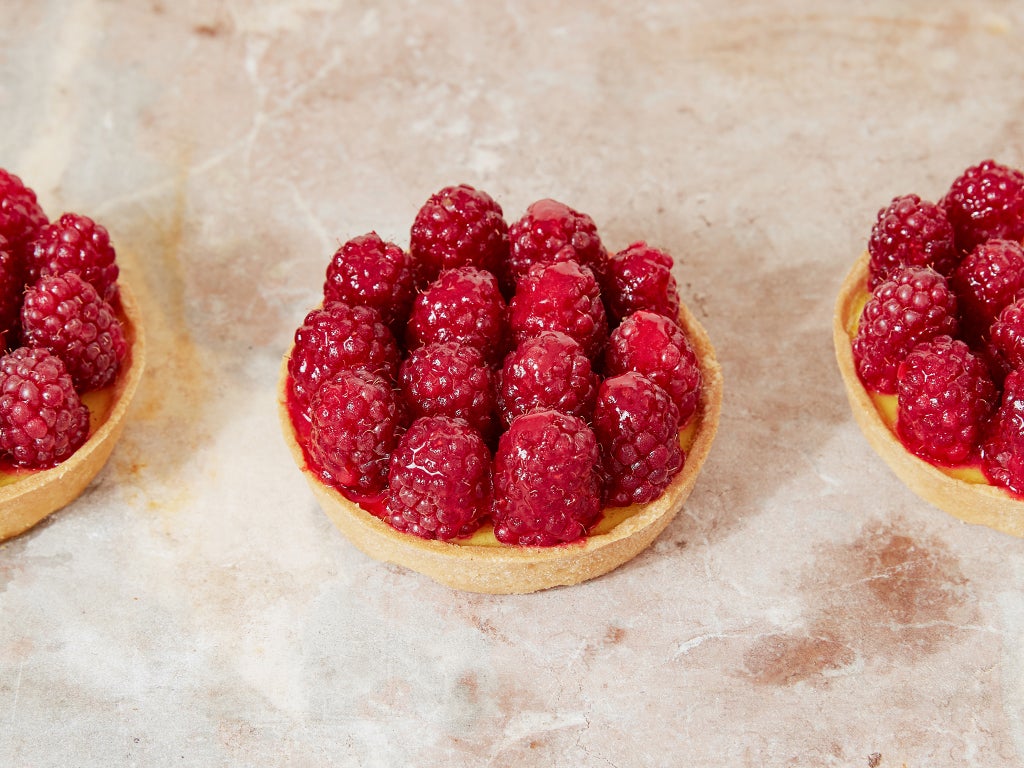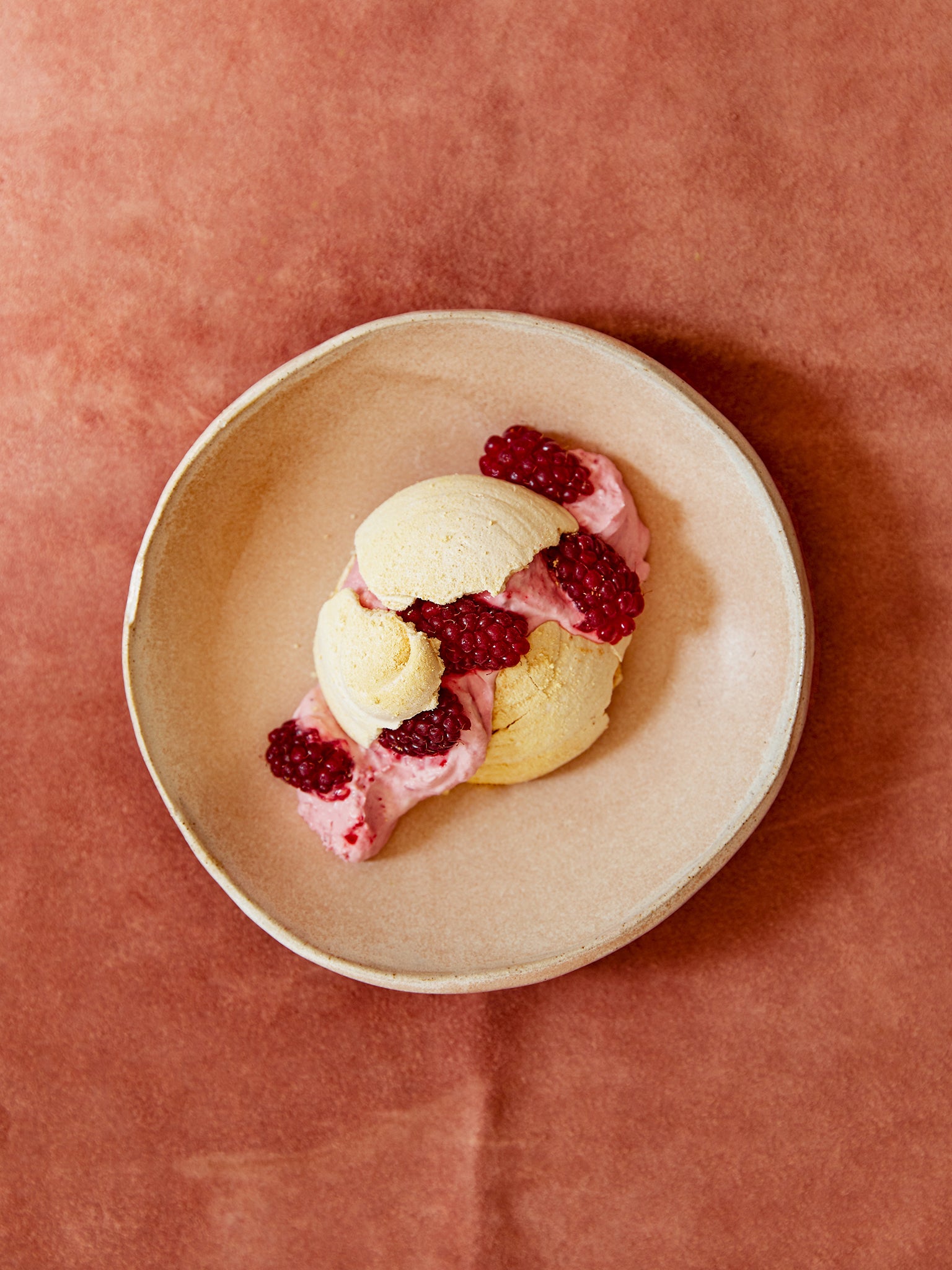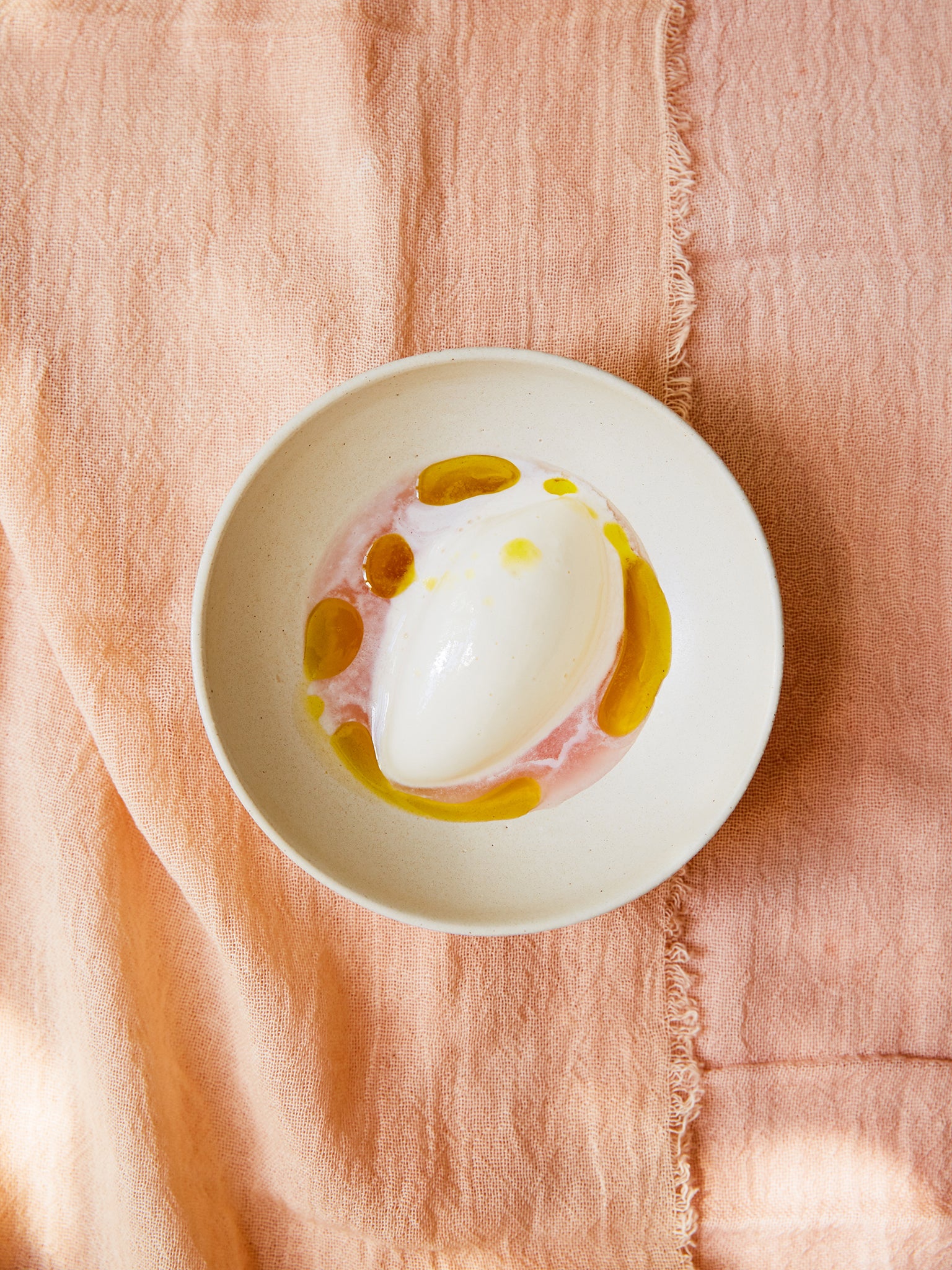
Supremely elegant, custard tarts are the perfect interplay between crisp pastry and just-set silken custard,” says Anna Higham.
Her recipe is inspired by Marcus Wareing’s, which Higham says “pretty much every London chef uses”.
In this version, the custard is infused with toasted hay – pet shops are a great place to get hold of some.
Hay custard and tayberry tart
Makes: 6 individual tarts
Ingredients:
For the sweet pastry:
350g plain (all-purpose) flour
100g icing sugar
225g cold unsalted butter, diced
Pinch of salt
3 eggs: 3 yolks, 1 white
For the hay-infused cream:
30g hay
600ml double cream
For the custard:
140g egg yolks, from about 7 eggs
50g caster sugar
450g hay-infused cream
To serve:
200g tayberries, plus 100g per tart
100g icing sugar
Method:
1. To make the pastry: combine the flour, icing sugar, butter and salt in a food processor and blitz to fine breadcrumbs. Add the egg yolks and mix until the dough is starting to come together. Turn out on to a work surface and knead firmly, just enough to bring the dough together. Wrap in cling film and chill until firm.
2. Roll out the dough on a floured surface to a thickness of 2-3mm then cut out 15cm circles. Press into six 10cm tart cases, pushing the pastry into the edges. Chill the lined tart cases for 30 minutes in the fridge or freezer.
3. Preheat the oven to 180C (350F). Trim the excess pastry to give a neat finish. Line each tart with scrunched-up baking parchment, fill with baking beans and bake for 12-15 minutes until the top edge is starting to colour. Remove the baking beans and return the tarts to the oven for a further five minutes or until golden brown. Brush the insides with beaten egg white and leave to cool, still in their cases.
4. To make the cream: preheat the oven to 180C. Place the hay on a baking tray and top with a cooling rack to help weigh it down. Toast in the oven for about 20 minutes until it smells very fragrant. Meanwhile, heat the cream in a saucepan over a low heat until it is starting to steam. Add the toasted hay and cover tightly. Leave to infuse in the fridge for three to four hours or overnight. Warm the cream gently then strain through a sieve, making sure to really squeeze out the hay to capture as much flavour as possible.
5. Preheat the oven to 115C with as low a fan as possible. Whisk together the egg yolks and sugar. Slowly whisk in the warm hay-infused cream to combine. Pass through a fine sieve. Pour into a saucepan and heat gently until the custard reaches 40C.
6. Place the tart cases on a baking tray and pour in the warmed custard. I like to put the tray in the oven before doing this so that I can fill the tarts as high as possible without spilling the custard on my way to the oven. Bake for 20-25 minutes until the tarts have that gentle wobble. Leave to cool before removing from the tart cases.
7. Blend 200g of tayberries with the icing sugar and pass through a fine sieve. Use this purée to dress the remaining tayberries and to cover the surface of the tarts just before serving.
Milk meringue with tayberries and yoghurt mousse

“As a kid, I was always a huge fan of the milk bottle sweets you would get as part of a pick’n’mix selection,” says Higham. “This recipe is a definite nod to those milky treats.”
To accompany the milk meringue, you can buy tayberries on Amazon and other online food stockists, but the dish works with any berry – raspberries, or you could try gooseberries or rhubarb too.
“The meringue can be tooth-achingly sweet but is balanced by the acidity of the yoghurt mousse alongside the wild-tasting berries,” Higham adds.
Ingredients:
For the yoghurt mousse (serves 6):
110ml whole milk
40g caster (superfine) sugar
15g (2tbsp) cornflour
500g thick plain yoghurt
250ml double cream
For the milk meringue (makes 15):
200g egg whites, from 6-7 eggs
Pinch of salt
400g caster sugar
50g (6tbsp) milk powder
To serve:
250g tayberries
4-5 perfect tayberries, to serve
Method:
1. To make the meringue; preheat the oven to 120C with as low a fan setting as possible. Combine the egg whites and salt in a mixer with a whisk attachment. Whisk at medium-slow speed so that you build a strong, stable meringue. Once the whites hold soft peaks, add the sugar one third at a time, whisking well between each addition.
2. Once all the sugar has been incorporated and you have a strong, glossy meringue, gently fold in the milk powder. Line a baking sheet with baking parchment or a silicone mat. Either pipe the meringue into 6-7cm domes or use two spoons to scoop quenelles onto the lined trays.
3. Bake for two to two-and-a-half hours. The meringues should be crisp on the outside with a slightly gooey centre. Leave to cool in the oven with the door slightly ajar then store in an air tight container until ready to serve.
4. To make the yoghurt mousse; whisk together the milk, sugar and cornflour in a saucepan. Place over a medium heat and continue whisking gently until the mixture comes to the boil and has thickened. Pour into a shallow container and chill completely in the fridge. Combine the milk mixture with the yoghurt, and add 100g of tayberries in a food processor and blend until completely smooth (so that the fruit is pureed through the base). Whip the double cream until it holds medium peaks and gently fold through the thickened yoghurt. Leave to set in the fridge before using.
5. To serve, take three tablespoons of yoghurt mousse and add the remaining tayberries along with the whipped double cream, folding through so that you get larger pieces of slightly crushed berries.
6. Use a sharp knife to cut the top of the meringue and divide it into three rough pieces. Place the base of the meringue in a shallow bowl or plate and spoon the tayberry and yoghurt mousse on top. Scatter the tayberries over the mousse then cover some of the mousse with the top of the meringue.
Ricotta ice cream with magnolia syrup

“This is one of the prettiest dishes I’ve made,” says Higham. “The ricotta ice cream provides a delicate sweet-savoury base to showcase the gingery spice of the liquor.
“It has enough body from the high percentage of ricotta to provide textural contrast to the thin syrup even as it melts.”
She recommends a buttery, gently peppery olive oil for this recipe.
Ingredients:
For the ricotta ice cream (makes 800ml):
150g caster sugar
500g fresh ricotta
25ml lemon juice
Small pinch of salt
For the magnolia syrup (makes 1L):
150g caster sugar
100g (2-3) magnolia flowers
7g (1 tsp) citric acid
To serve:
A small pinch of Maldon salt
Magnolia petals
1 tsp extra virgin olive oil
Method:
1. To make the magnolia syrup: combine the sugar with 750ml of water in a saucepan. Bring to a rolling boil over a medium heat until the sugar has dissolved. When the syrup is boiling, add the whole magnolia flowers. Return to a rolling boil and add the citric acid. Immediately transfer to a shallow container then chill over ice or in the fridge. I like to leave the flowers in the syrup as they have a pleasingly ethereal quality. Store chilled.
2. To make the ricotta ice cream; combine the sugar with 150ml of water in a saucepan, whisk well and place over a medium heat. Stir occasionally until the sugar is completely dissolved, leave to cool then chill thoroughly.
3. Once the syrup is completely chilled, add the lemon juice, then blend in the ricotta until it is smooth and season with a little salt. Churn in an ice-cream machine then transfer to a container and leave to set in the freezer before serving.
4. To assemble the dish: place a small bowl in the freezer to chill 30 minutes before serving. Scoop a large quenelle of ricotta ice cream into the chilled bowl and place just off-centre. Sprinkle on some Maldon salt and lay one or two magnolia petals beside the ice cream. Combine the magnolia syrup (two tablespoons) and olive oil (they will remain split). Pour the syrup and oil into the bowl next to the ice cream.
‘The Last Bite: A Whole New Approach To Making Desserts Through The Year’ by Anna Higham (published by DK, £22; photography by Kim Lightbody), available now.







